Quick Summary:
Finding the right Ruby on Rails developer is like finding the missing piece that makes a puzzle complete. This guide offers insights into essential skills, hiring options, candidate evaluation, and potential pitfalls. By following these steps, you can build a high-performing Ruby on Rails team that aligns with your project goals and fosters long-term success.
In this blog, we’re going to discuss 📝
- Demand for Ruby on Rails Developers
- The Importance of Finding the Right Rails Developer
- Understanding the Ruby on Rails Skillset
- Things to Consider Before Hiring Ruby on Rails Developers
- Hiring Options for Ruby on Rails Developers
- Interview Process for Ruby on Rails Developers
- Common Mistakes to Avoid While Hiring Ruby on Rails Developers
- Cost to Hire Ruby on Rails Developers
- Tips for Building a Strong Rails Team
In the ever-evolving tech landscape, Ruby on Rails stands out as a beacon of simplicity and efficiency. This powerful framework has revolutionized web development with its clean, elegant code and rapid development cycle. With a strong emphasis on convention over configuration, Rails simplifies many aspects of web development, making it a preferred choice for startups and established businesses alike. Finding and hiring top Ruby on Rails developers is crucial for ensuring your project’s success. This guide will help you find the best talent for your needs.
Demand for Ruby on Rails Developers
Ruby on Rails developers continue to enjoy strong and steady demand within the tech industry. RoR being known for its fast development cycle, scalability, and active community, it has become a go-to framework for building web applications across a wide range of industries and thus increase the demand & search for Ruby on Rails developers.
- Average salary: $97,000 to $142,000 per year (USA), as per report.
- Number of job postings: 4,000+ Ruby on Rails jobs listed on job boards like Indeed and LinkedIn in 2024- report
- Job growth: 13% increase in web developer roles projected from 2022 to 2032 (BLS)
- GitHub repositories: 850,000+ repositories listed with Ruby on Rails code
- Developers on Stack Overflow: 5.5% of developers identify as Ruby developers
The Importance of Finding the Right Rails Developer
Given the consistent demand for Ruby on Rails developers, it’s crucial to understand the importance of finding the right talent for your project. The right developer can significantly impact the success of your web application.
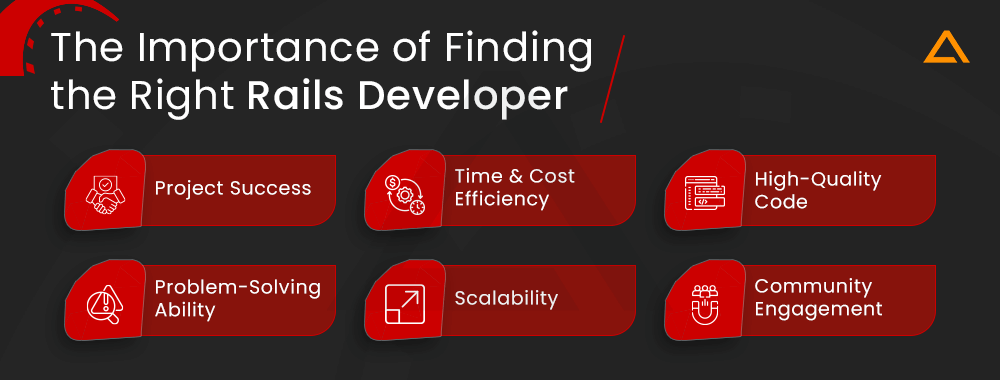
Key Reasons Why Finding the Right Rails Developer is Crucial:
- Project Success: A skilled Rails developer ensures that your web application is built efficiently, aligns with your project goals, and delivers an excellent user experience.
- Time and Cost Efficiency: A qualified developer works effectively, reducing development time and keeping project costs under control.
- High-Quality Code: Experienced developers write clean, well-organized, and maintainable code, which enhances the long-term viability and performance of your application.
- Problem-Solving Ability: The right Rails developer can tackle complex technical challenges and deliver innovative solutions, contributing to the overall success of your project.
- Scalability: A knowledgeable developer knows how to scale ruby on rails application that accommodate future growth and handle increasing traffic without significant overhauls.
- Community Engagement: Developers who are actively involved in the Rails community are more likely to stay current with the latest trends and best practices, adding value to your project.
Understanding the Ruby on Rails Skillset
When hiring a Ruby on Rails developer, understanding their skill set is crucial to ensuring they have the right expertise to meet your project’s needs. Ruby on Rails developers should possess a mix of core competencies, technical proficiencies, and soft skills that contribute to the overall success of your application. Whether you’re looking for a full-stack developer or someone specialized in backend development, knowing what to expect can streamline the hiring process.
Core Competencies of Ruby on Rails Developers
Ruby on Rails developers should possess a strong foundation in Ruby programming and a deep understanding of the framework’s core concepts. Key competencies include:
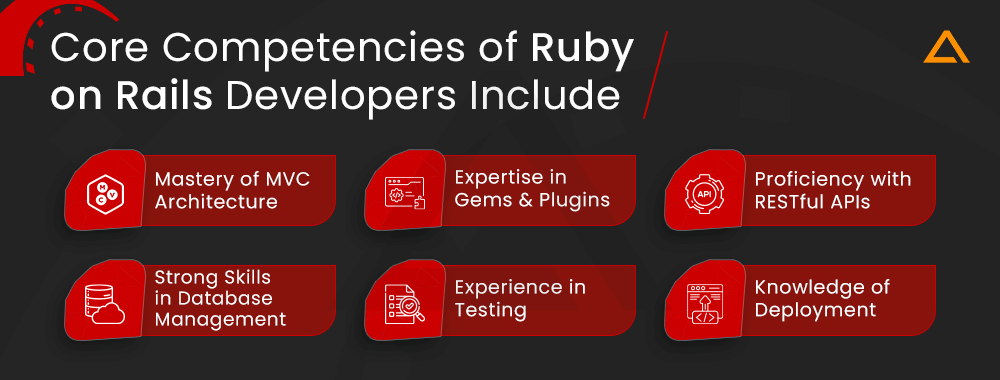
- MVC Architecture: A solid grasp of the Model-View-Controller design pattern and its implementation in Ruby on Rails.
- Gems and Plugins: Familiarity with the extensive ecosystem of Ruby gems and plugins to extend application functionality.
- RESTful APIs: Proficiency in building and consuming RESTful APIs within the Rails framework.
- Database Management: Expertise in working with databases like PostgreSQL or MySQL and using Object-Relational Mapping (ORM) systems like ActiveRecord.
- Testing: Knowledge of testing frameworks such as RSpec and Minitest to ensure code quality through unit, integration, and system tests.
- Deployment: Experience with deployment tools and platforms, including Heroku, Capistrano, and AWS.
Technical & Soft Skills to Look For
When assessing Ruby on Rails developers, consider both their technical expertise and soft skills, which are critical for team collaboration and project success.
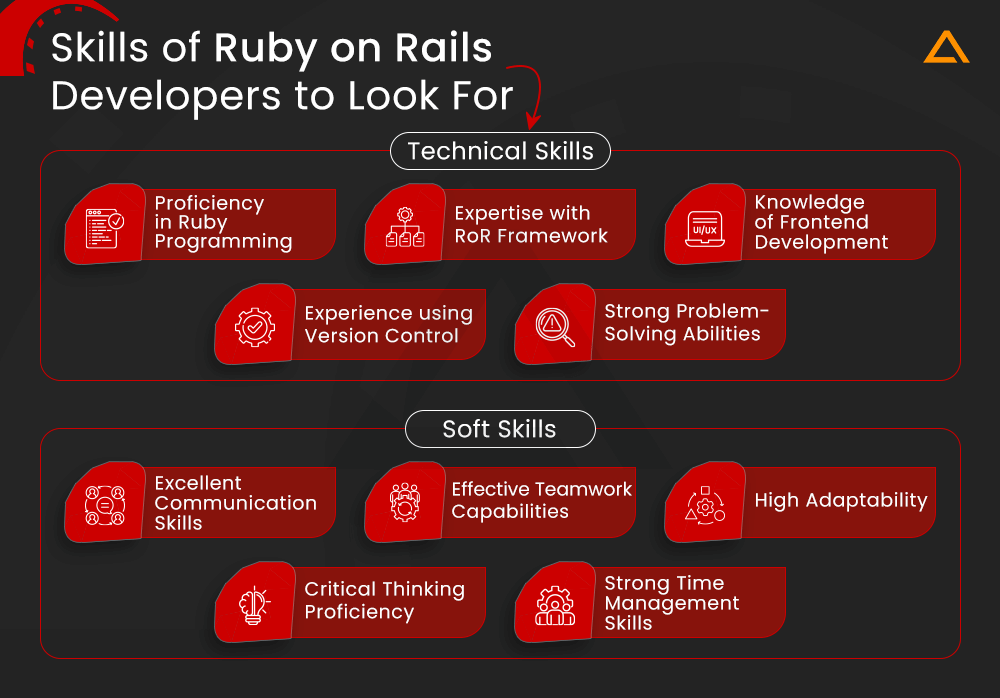
Technical Skills:
- Ruby Programming: Proficiency in Ruby syntax, object-oriented programming, and advanced concepts like meta programming.
- RoR Framework: In-depth understanding of Ruby on Rails conventions, patterns, and best practices.
- Frontend Development: Basic knowledge of HTML, CSS, and JavaScript for creating user interfaces.
- Problem-Solving: Strong debugging skills and the ability to troubleshoot complex issues.
Soft Skills:
- Communication: The ability to articulate ideas clearly and work effectively with team members and stakeholders.
- Teamwork: A collaborative mindset and the ability to contribute positively to team dynamics.
- Adaptability: Willingness to embrace new technologies and adjust to evolving project requirements.
- Critical Thinking: Problem-solving abilities that allow for creative and effective solutions.
- Time Management: Strong organizational skills to manage deadlines and prioritize tasks effectively.
Full-Stack vs Specialized Developers
When hiring Ruby on Rails developers, it’s important to decide whether you need a full-stack developer or a specialized developer based on your project’s requirements:
- Full-Stack Developers: These developers handle both frontend and backend tasks, offering a versatile skill set that can be beneficial for smaller teams or startups.
- Specialized Developers: Depending on your project, you might prefer a developer with a specific focus, such as:
- Backend Developers: Experts in server-side logic, APIs, and database management.
- Frontend Developers: Specialists in user interface design, with a deep understanding of HTML, CSS, JavaScript, and Rails integration for creating interactive and responsive applications.
Things to Consider before Hiring Ruby on Rails Developers
Before hiring a Ruby on Rails developer, it’s essential to thoroughly assess your project’s needs. Understanding the scope, goals, and technical requirements of your project will help you identify the right candidate and ensure they possess the necessary skills to meet your objectives. Clear project assessment also aids in setting realistic expectations and aligning your developer’s expertise with your project’s demands.

Defining Project Goals and Requirements
Start by clearly defining what you want to achieve with your project. This includes outlining the core objectives, desired features, and overall vision. Understanding these aspects will guide you in determining the specific expertise and experience required from your Ruby on Rails developer.
- Project Objectives: What are the main goals of the project? Are you developing a new web application, enhancing an existing one, or building a platform from scratch?
- Key Features: List the essential features and functionalities needed. Consider user authentication, payment processing, or integration with other services.
- Timeline and Budget: Establish the project timeline and budget constraints. This will help in finding a developer who can work within your constraints and deliver on time.
Evaluating the Complexity and Scalability of the Project
Assess the complexity and scalability requirements of your project to determine the level of expertise needed from your developer. Projects that involve complex features or high traffic demands will require a more experienced developer with a robust understanding of Ruby on Rails.
- Complexity: Evaluate the technical complexity of your project. Does it involve intricate logic, extensive data processing, or advanced integrations?
- Scalability: Consider how your project will scale. Will it need to handle a growing number of users or data? A developer with experience in scalable architectures will be crucial.
Identifying Specific Rails Skills Needed
Identify the specific skills and experience required for your project based on its goals and complexity. This will help you focus your search on developers who possess the necessary technical expertise.
- Core Rails Skills: Ensure proficiency in Ruby on Rails fundamentals, including MVC architecture, gems, and RESTful APIs.
- Frontend Integration: Determine if you need a developer with frontend skills for a more integrated user experience.
- Database Management: Assess the need for expertise in managing databases and ORM systems, particularly if your project involves complex data interactions.
- Deployment Experience: Consider if experience with deployment tools and platforms is necessary for your project’s deployment and maintenance needs.
Hiring Options for Ruby on Rails Developers
When looking to hire a Ruby on Rails developer, you have several options, each with its own advantages and considerations. Choosing the right hiring model depends on your project’s needs, budget, and long-term goals. Understanding the different types of hiring options can help you make an informed decision and find the best fit for your development needs.
In-House Developers
Hiring an in-house Ruby on Rails developer means bringing someone onto your permanent team. This option offers direct control over the development process and greater alignment with your company’s culture and goals.
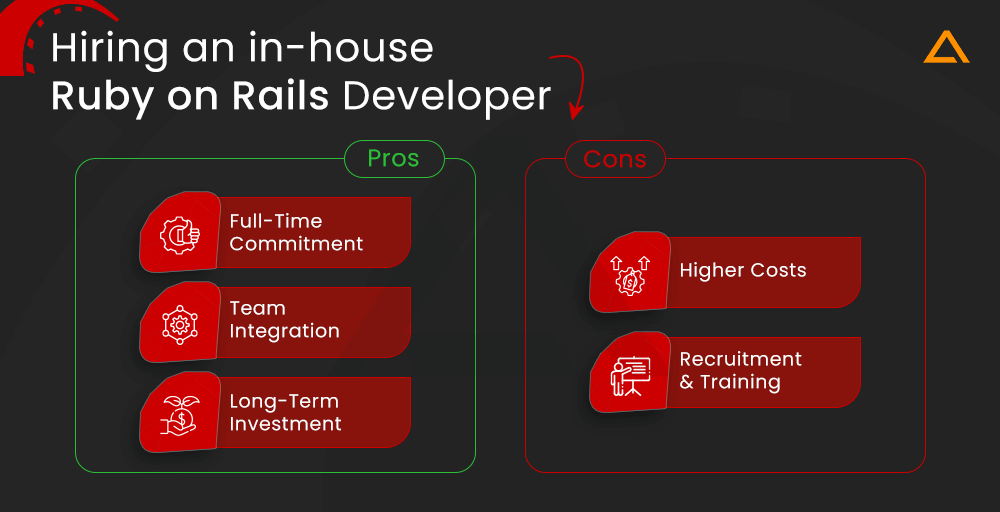
Advantages:
- Full-Time Commitment: Developers are dedicated to your project and available for ongoing maintenance and updates.
- Team Integration: Easier integration with your existing team and better communication.
- Long-Term Investment: Potential for developing deep expertise in your project and company.
Considerations:
- Higher Costs: Includes salary, benefits, and overhead costs.
- Recruitment and Training: Time and effort needed to find and train the right candidate.
Freelancers
Freelancers are independent professionals who work on a contract basis. This option can provide flexibility and cost-effectiveness for specific projects or short-term needs.
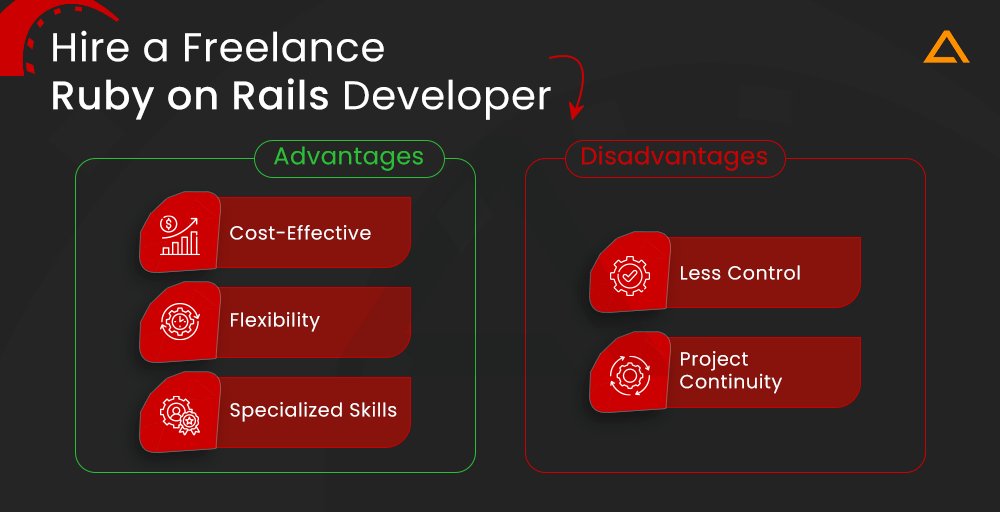
Advantages:
- Cost-Effective: Typically, lower costs compared to full-time employees.
- Flexibility: Ability to scale up or down based on project needs.
- Specialized Skills: Access to developers with specific expertise for particular tasks.
Considerations:
- Less Control: Potential challenges in communication and integration with your team.
- Project Continuity: Limited availability for ongoing support and maintenance.
Agencies and Development Firms
Agencies and development firms offer a team of developers and often provide a range of services, from project management to quality assurance. This option is suitable for larger projects or when you need a comprehensive solution.
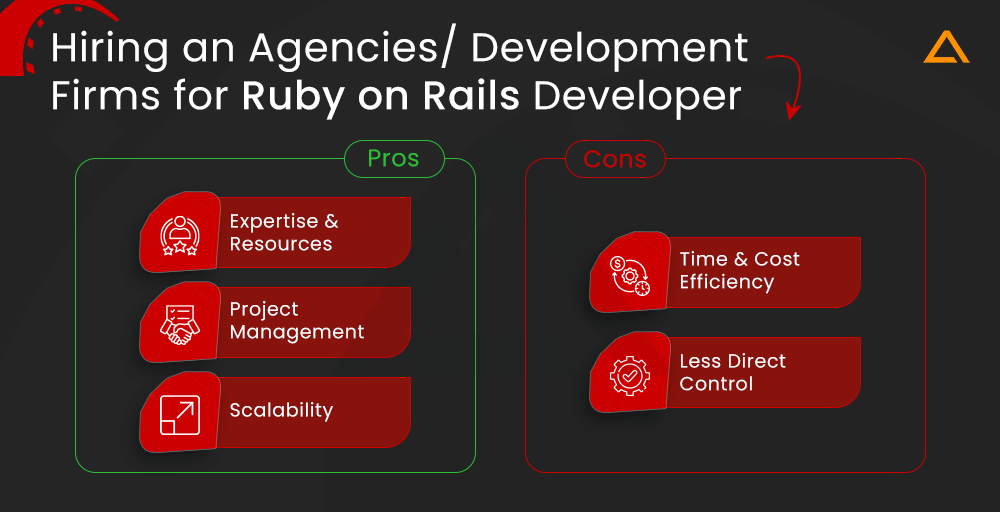
Advantages:
- Expertise and Resources: Access to a team of skilled professionals with diverse expertise.
- Project Management: Agencies often handle project management, reducing your workload.
- Scalability: Ability to handle complex projects and scale resources as needed.
Considerations:
- Time and Cost Efficiency: Agencies can reduce the acquisition cost of developers by handling tasks such as setting up interviews and filtering candidates, making them more time and cost-efficient than hiring in-house developers or freelancers.
- Less Direct Control: Less control over the day-to-day development process compared to in-house teams.
Pros and Cons of Each Hiring Option
| Feature | In-house Developers | Freelancers | Agencies and Development Firms |
| Control | High | Low | Medium |
| Cost | High | Low | Medium |
| Flexibility | Low | High | Medium |
| Commitment | Long-term | Short-term | Project-based |
| Quality | High potential | Varies | High potential |
| Communication | Direct | Can be challenging | Can be challenging |
Choosing between an agency, freelance and in-house hiring often comes down to project scope and specific needs. Agencies provide a well-rounded team that can quickly adapt to different stages of development, ensuring that your project benefits from a diverse set of skills.
Entire Team Hiring Benefits
Hiring an entire Rails team rather than individual developers can offer several advantages. A full team can work more efficiently and collaboratively from day one, speeding up development and reducing onboarding time.

- Team Synergy: A cohesive team that has already worked together will have established workflows and communication, reducing friction.
- Aligned Goals: With a full team, everyone will be on the same page from the beginning, leading to better alignment with your project’s goals.
- Greater control: You have complete control over the team’s structure and operations.
- Stronger company culture: Building a dedicated in-house team can foster a stronger company culture.
- Long-term commitment: In-house developers are more likely to be committed to your company and its goals.
Outsourcing Team Hire Benefits
Outsourcing your Rails team to an external agency or development firm can offer flexibility and access to specialized talent.

- Cost Efficiency: Outsourcing can reduce costs associated with hiring, training, and maintaining in-house developers.
- Scalability: You can easily scale your development resources up or down as your project evolves.
- Expertise: Outsourced teams often come with specialized knowledge and experience in different industries, bringing valuable insights to your project.
Resources While Hiring a Team
When building a Rails team, it’s essential to include resources that ensure smooth project execution and quality control.

- Project Manager: While you can manage the team yourself, having a dedicated project manager can significantly enhance productivity by overseeing timelines, budgets, and overall project coordination.
- Testing Team: Including a testing team ensures that your application is thoroughly tested for bugs and performance issues, leading to higher-quality end products.
- UI/UX Designers: Having UI/UX experts on board can improve the user experience and design of your application, making it more appealing and user-friendly.
- DevOps team: A DevOps team can streamline deployment automation and ensure your application’s reliability and optimal performance.
Looking to Hire RoR Developer?
Amplify Your In-House Expertise with Aglowid’s Seasoned Ruby on Rails Specialists
Interview Process for Ruby on Rails Developers
Hiring the right Ruby on Rails developer requires a structured interview process that evaluates both technical and soft skills. A thorough interview process helps you identify candidates who not only have the required expertise but also align with your project goals and team culture. Below is a guide to structuring an effective interview process for Ruby on Rails developers.

Screening Candidates: Resumes, Portfolios, and GitHub Repositories
The first step in the interview process is to screen candidates based on their resumes, portfolios, and GitHub repositories. This allows you to assess their previous work and gauge their level of expertise before moving to the next stage.
- Resumes: Look for relevant experience, such as past projects involving Ruby on Rails and proficiency in related technologies like databases, APIs, and front-end development.
- Portfolios: Review their portfolio to see real-world examples of their work, focusing on the quality of the applications they’ve built.
- GitHub Repositories: Examine their GitHub repositories for contributions to open-source projects, coding style, and the complexity of the projects they’ve worked on.
Top Technical Interview Questions
Including specific technical questions in your interview helps evaluate the candidate’s depth of knowledge and practical experience. Here are some key questions and what to look for in their responses:
Question: Explain the MVC architecture in Ruby on Rails.
What to Look For: A clear understanding of how the Model-View-Controller pattern works in Rails and how they structure applications using this architecture.
Question: How do you manage database migrations in Rails?
What to Look For: Experience with Rails migrations, including creating, running, and rolling back migrations. Look for insights on handling complex migrations and schema changes.
Question: Can you explain the concept of RESTful routes in Rails?
What to Look For: A deep understanding of RESTful principles and how Rails implements them through routes and controllers. Watch for familiarity with REST conventions and best practices.
Question: What are some security features available in Ruby on Rails, and how do you implement them?
What to Look For: Knowledge of Rails’ built-in security features like CSRF protection, SQL injection prevention, and session management. Candidates should demonstrate awareness of common security vulnerabilities and how to address them.
Question: How do you optimize the performance of a Rails application?
What to Look For: Experience with performance tuning techniques such as caching, database query optimization, and using background jobs. Look for a candidate who understands how to balance performance with maintainability.
Question: Describe your experience with testing in Rails using tools like RSpec or Minitest.
What to Look For: Familiarity with testing methodologies and tools. Look for a candidate who writes unit, integration, and system tests and understands the importance of test coverage.
Question: What is your approach to debugging and troubleshooting in Rails?
What to Look For: Problem-solving skills, including how they identify and fix bugs. Watch for their use of debugging tools, logs, and systematic approaches to resolve issues.
Assessing Problem-Solving and Coding Skills
In addition to technical questions, it’s crucial to evaluate the candidate’s problem-solving abilities and coding skills through hands-on assessments. These assessments allow you to see how they approach challenges and implement solutions in real-time.
- Coding Challenges: Provide them with coding tasks that mimic real project scenarios, focusing on Ruby on Rails best practices.
- Debugging Exercises: Ask them to troubleshoot existing code, identify bugs, and propose fixes, demonstrating their analytical thinking.
- Algorithmic Problems: Include algorithmic problems that test their ability to write efficient, optimized code.
Evaluating Communication and Collaboration
Technical skills are essential, but successful developers also need strong communication and collaboration abilities. Since they’ll be working closely with your team, assessing how well they communicate and collaborate is key to ensuring a smooth workflow.
- Clear Communication: Gauge their ability to explain technical concepts clearly and concisely, both to developers and non-technical stakeholders.
- Collaboration: Discuss their experience working in team environments, including their approach to peer reviews, code collaboration tools, and team meetings.
- Adaptability: Ask how they handle changing requirements and feedback, and how they maintain a positive and productive attitude under pressure.
Common Mistakes to Avoid While Hiring Ruby on Rails Developers
Hiring the right Ruby on Rails developer requires careful planning and execution. Many companies make common mistakes during the hiring process that can lead to challenges down the line. By being aware of these pitfalls, you can make better hiring decisions and set your project up for success.
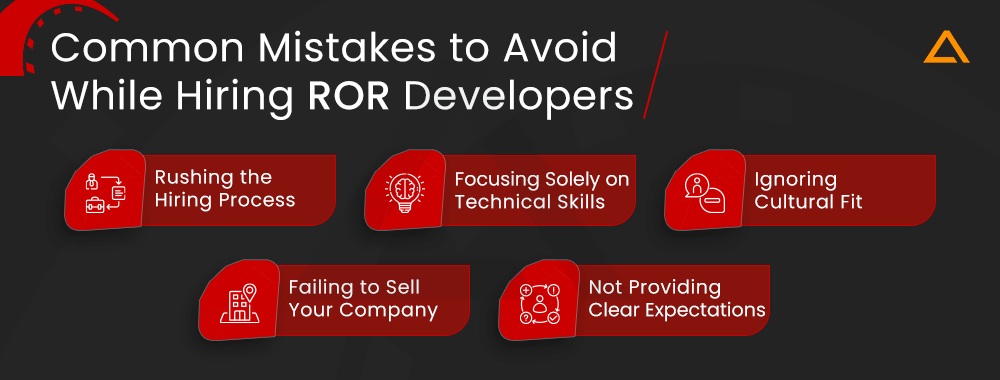
Rushing the Hiring Process
When there’s pressure to fill a role quickly, it’s easy to rush through the hiring process. However, this can lead to overlooking key details and selecting a candidate who may not be the best fit for your project.
- What to Avoid: Skipping important steps such as thorough screening, technical assessments, or multiple interviews can result in hiring someone without fully understanding their capabilities.
- Solution: Since the client needs a developer quickly and may not have time for a full technical assessment, an alternative solution could be to hire freelancers from platforms like Upwork, Fiverr, or Toptal by verifying their credibility. Alternatively, engaging with outsourcing agencies that provide hand-picked developers, offering proper contracts and quick onboarding to the team, can also be an efficient approach.
Focusing Solely on Technical Skills
While technical proficiency is crucial, it’s a mistake to focus only on a candidate’s coding abilities without considering other important qualities.
- What to Avoid: Hiring someone based solely on their technical skills can overlook their ability to collaborate, communicate, or adapt to your company culture.
- Solution: Look for candidates who balance technical skills with soft skills like problem-solving, teamwork, and communication.
Ignoring Cultural Fit
A developer may have the right technical skills, but if they don’t align with your company culture, it can lead to friction and dissatisfaction in the long term.
- What to Avoid: Overlooking cultural fit can result in poor team dynamics and lower productivity, regardless of the developer’s technical skills.
- Solution: Consider how the candidate’s values, work style, and personality align with your company culture and team environment.
Failing to Sell Your Company
Just as you’re evaluating the candidate, they’re also evaluating you. If you don’t highlight the benefits of working with your company, you may lose top talent to competitors.
- What to Avoid: Focusing only on what the candidate can bring to your company without showcasing what your company can offer in return, such as career growth opportunities, work-life balance, or exciting projects.
- Solution: Clearly communicate your company’s unique selling points, such as your mission, values, and perks, to attract top-tier candidates.
Not Providing Clear Expectations
Without clear expectations, developers may struggle to understand their role, leading to miscommunication, missed deadlines, or poor project outcomes.
- What to Avoid: Vague job descriptions or unclear project goals can lead to misunderstandings and dissatisfaction from both the developer and your team.
- Solution: Clearly define the role, responsibilities, and project expectations from the outset. Provide detailed documentation and regular check-ins to ensure alignment.
Cost to Hire Ruby on Rails Developers
Hiring Ruby on Rails developers can vary widely in cost, depending on several factors. Understanding the different cost components is crucial to budgeting effectively and making informed decisions. Here’s a breakdown of the key elements that influence the cost to hire Ruby on Rails developers.

Factors Affecting Hiring Costs
The cost of hiring Ruby on Rails developers is influenced by a range of factors, from the developer’s experience level to geographic location.

- Experience Level: Junior developers cost less than senior developers, but the level of expertise needed for your project will affect overall costs.
- Location: Developers in certain regions (e.g., North America or Western Europe) typically command higher salaries than those in regions like Eastern Europe or Asia.
- Type of Hire: Whether you hire in-house, work with freelancers, or outsource to an agency, the costs will vary significantly.
- Project Complexity: More complex projects may require highly specialized developers, driving up costs.
Salary Ranges for Ruby on Rails Developers
The salary of Ruby on Rails developers can vary based on experience, location, and industry. Below is a general overview of salary ranges:
| Region | Junior Developer (USD/year) | Mid-Level Developer (USD/year) | Senior Developer (USD/year) |
| United States | $70,000 – $90,000 | $90,000 – $120,000 | $120,000 – $150,000 |
| Western Europe | $45,000 – $65,000 | $70,000 – $90,000 | $86,000 – $110,000 |
| Eastern Europe | $30,000 – $45,000 | $45,000 – $60,000 | $75,000 – $100,000 |
| Asia | $25,000 – $40,000 | $40,000 – $60,000 | $60,000 – $80,000 |
Please note that these are approximate salary ranges, and actual salaries may vary depending on specific factors.
Outsourcing to India
Outsourcing Ruby on Rails development to India has become a strategic choice for many companies looking to reduce costs while maintaining quality. With a large pool of skilled developers and competitive pricing, India is a top destination for outsourcing.
Average Hourly Rate
The average hourly rate for Ruby on Rails developers in India varies depending on experience and the complexity of the project. Generally, the rates range from:
- Junior Developers: $15 – $25 per hour
- Mid-Level Developers: $25 – $40 per hour
- Senior Developers: $40 – $60 per hour
These rates are significantly lower compared to Western countries, making India a cost-effective option.
Monthly Costs
For companies considering long-term engagements, hiring a dedicated Ruby on Rails developer on a monthly basis can be more efficient. The average monthly costs can be broken down as follows:
- Junior Developers: $2,000 – $3,500 per month
- Mid-Level Developers: $3,500 – $6,000 per month
- Senior Developers: $6,000 – $8,000 per month
This allows businesses to have full-time developers at a fraction of the cost compared to hiring locally.
Project-Based Costs
If you prefer to outsource a specific project rather than hiring developers on an hourly or monthly basis, project-based pricing is also an option. The cost depends on the scope, complexity, and duration of the project:
- Small Projects: $5,000 – $15,000
- Medium Projects: $15,000 – $40,000
- Large Projects: $40,000 and above
Benefits of Outsourcing to IT Companies in India
Outsourcing to IT companies in India provides several key benefits, making it an attractive option for businesses worldwide. With access to a vast talent pool and competitive pricing, companies can streamline operations while maintaining high-quality service delivery:
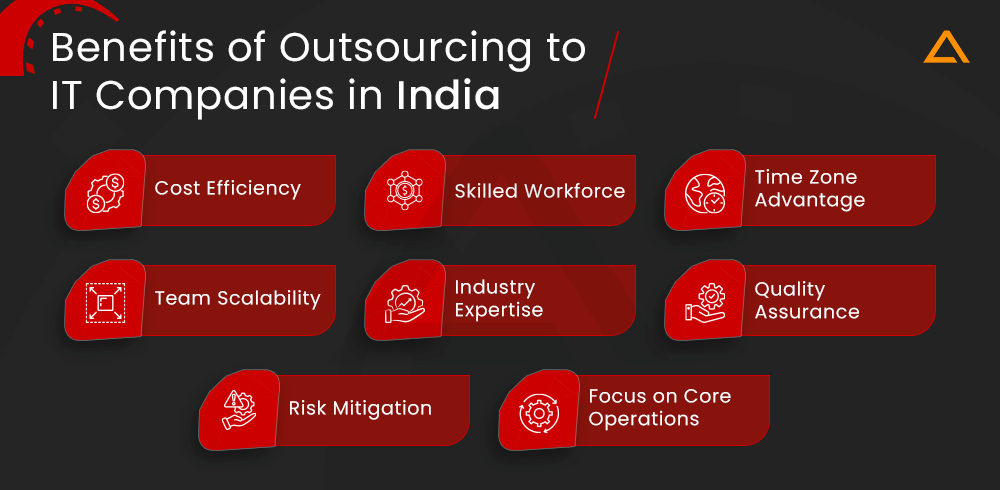
- Cost Efficiency: Outsourcing to India offers substantial labor cost reductions compared to hiring in-house developers, especially in high-cost regions.
- Skilled Workforce: India is home to a vast pool of Ruby on Rails developers with strong educational backgrounds and technical proficiency.
- Time Zone Advantage: The time zone difference between India and Western countries can facilitate overlapping work hours, enabling quicker project turnarounds.
- Team Scalability: Indian IT companies can rapidly scale their teams to accommodate your project’s growing demands, providing flexibility and adaptability.
- Industry Expertise: Many Indian IT companies have extensive experience across various industries, bringing valuable insights and specialized knowledge to your project.
- Quality Assurance: Leading Indian IT firms focus on delivering high-quality results, with thorough testing and quality assurance processes in place.
- Risk Mitigation: Partnering with a reputable Indian IT company helps mitigate risks such as project delays and employee turnover that can occur with in-house development.
- Focus on Core Operations: Outsourcing Ruby on Rails development allows your internal team to concentrate on core business functions, increasing overall efficiency.
Additional Costs
Beyond salary, there are additional costs to consider when hiring Ruby on Rails developers: 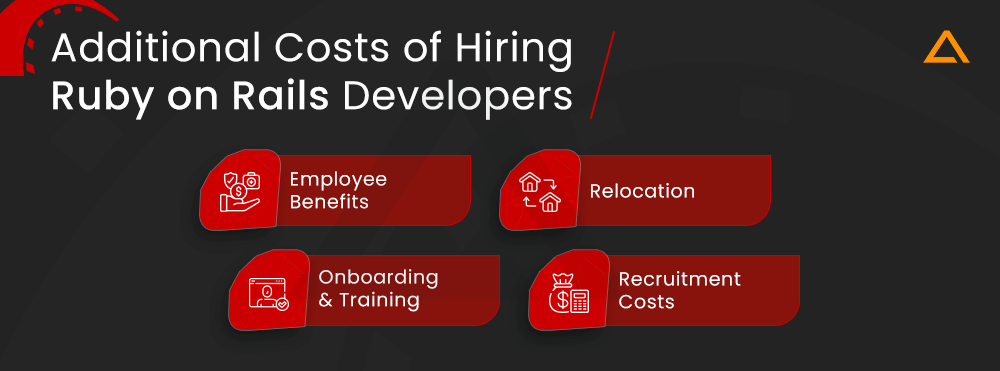
- Employee Benefits: For in-house developers, benefits such as health insurance, retirement plans, and paid time off can add 20-30% to the base salary.
- Relocation: If you need to relocate a developer, relocation assistance or expenses may be required, adding to the total cost.
- Onboarding and Training: Integrating a new developer into your team may require onboarding sessions and training, which could involve both time and money.
- Recruitment Costs: Whether through job boards, recruitment agencies, or other channels, the process of finding and hiring developers can incur additional costs.
Tips for Building a Strong Rails Team
Building a successful Ruby on Rails development team requires more than just hiring skilled developers. It involves fostering an environment that promotes growth, collaboration, and continuous improvement. Here are some key strategies to help you build a strong Rails team:

Providing Mentorship and Training
Offering mentorship and ongoing training to your Rails developers is essential for their growth and the success of your projects. By providing guidance and resources, you can help them improve their skills, which in turn will enhance your team’s overall productivity.
- Mentorship Programs: Pair junior developers with senior team members to provide on-the-job learning and feedback.
- Training Opportunities: Offer access to online courses, conferences, and workshops to keep the team updated on the latest Rails trends and practices.
- Code reviews: Conduct regular code reviews to provide feedback and improve code quality.
Fostering a Collaborative Work Environment
A collaborative work environment encourages open communication and teamwork, which can lead to more efficient problem-solving and better project outcomes.
- Regular Team Meetings: Schedule regular meetings to discuss project progress, challenges, and new ideas.
- Open Communication Channels: Encourage the use of tools like Slack or Microsoft Teams to facilitate continuous communication and collaboration among team members.
- Team-building activities: Organize team-building activities to enhance collaboration and camaraderie.
- Agile methodologies: Implement agile methodologies like Scrum or Kanban to promote teamwork and flexibility.
Encouraging Continuous Learning and Skill Development
The tech landscape is constantly evolving, and keeping your Rails team’s skills sharp is vital. Encourage a culture of continuous learning to ensure your team stays ahead of the curve.
- Skill Development Programs: Provide resources like coding challenges, hackathons, and peer reviews to promote skill growth.
- Continuous Education: Encourage developers to pursue certifications or additional education in emerging technologies related to Rails development.
Conclusion
Hiring the right Ruby on Rails developers is critical to the success of your web application. Whether you choose to bring on an in-house team, hire freelancers, or work with an agency, it’s essential to carefully assess your project needs and select the option that aligns best with your goals. By focusing on both technical and soft skills, avoiding common hiring pitfalls, and fostering a supportive, growth-oriented environment, you can build a strong Rails team that delivers high-quality results.
Ultimately, your investment in finding and nurturing the right talent will pay off through scalable, efficient, and reliable web applications that drive your business forward.




